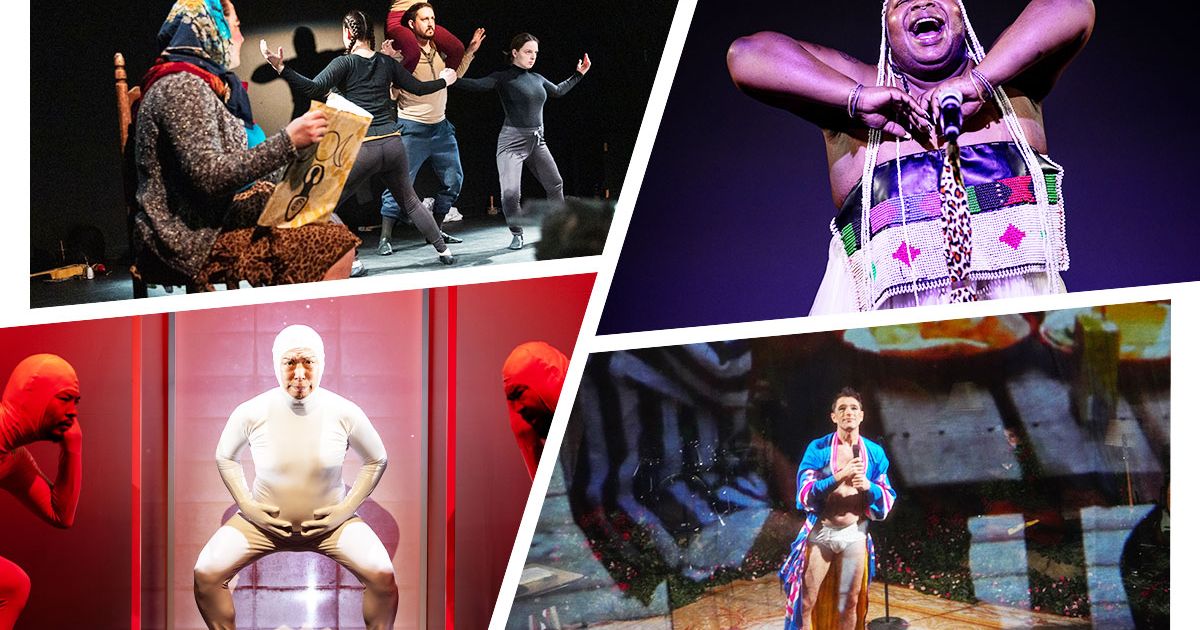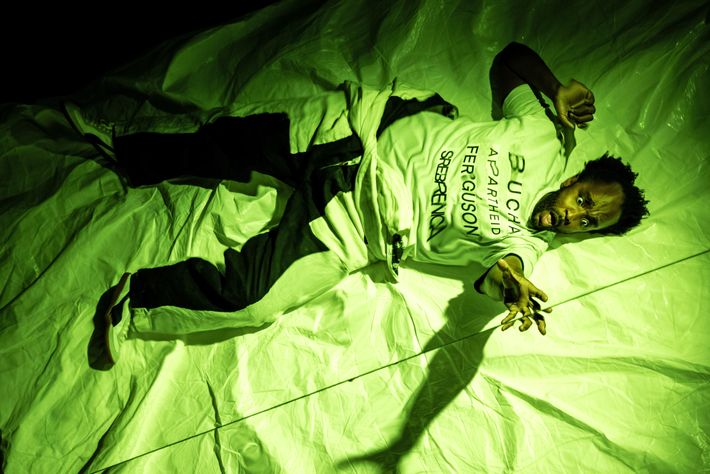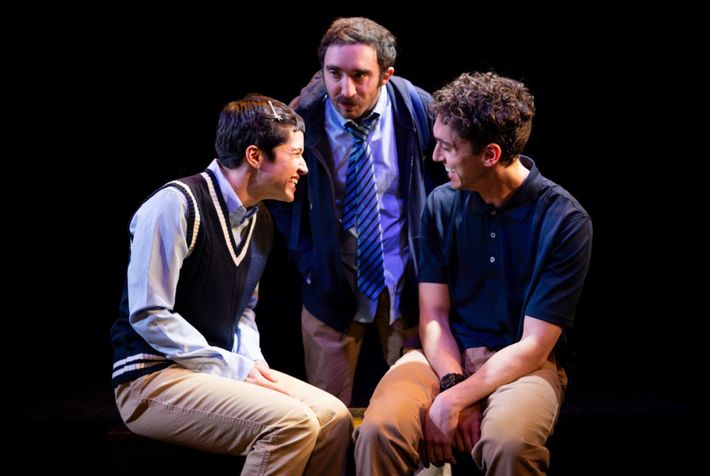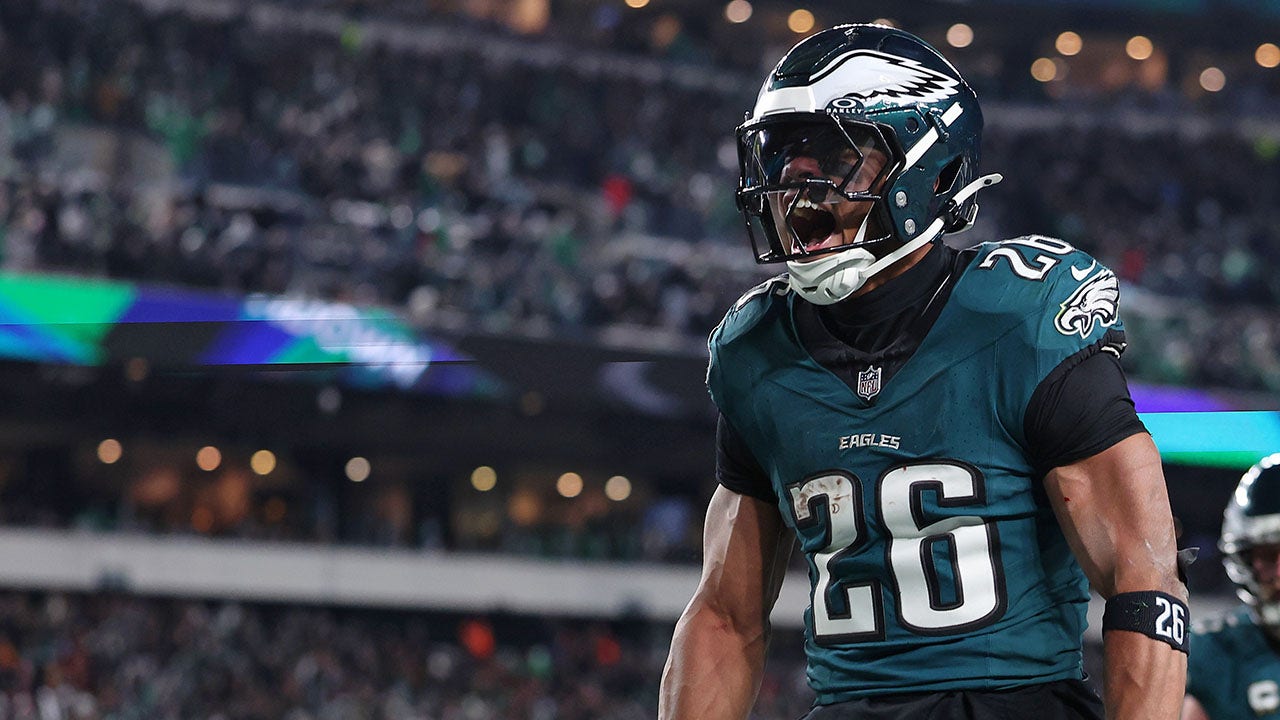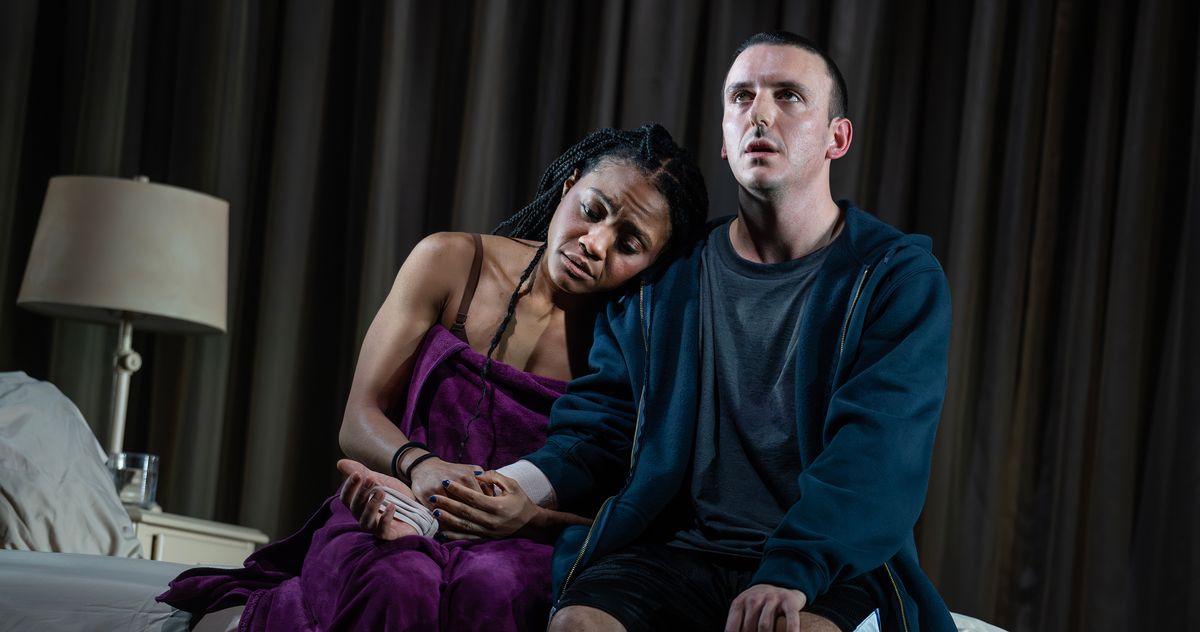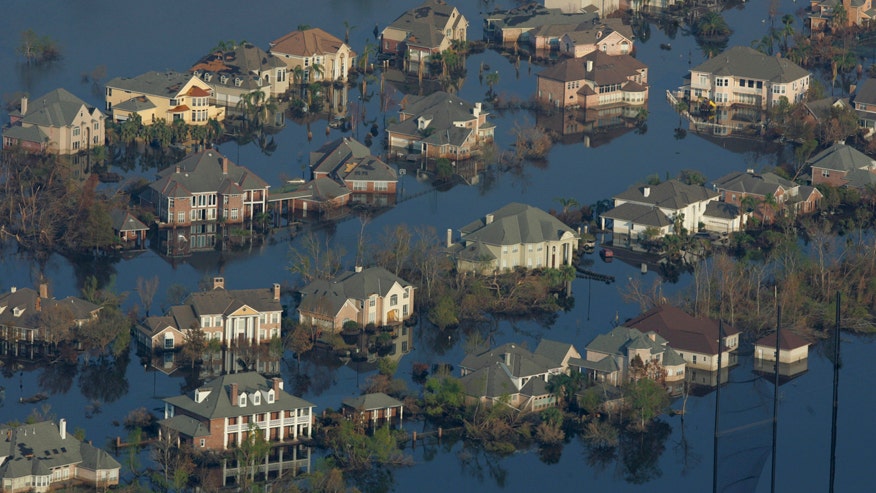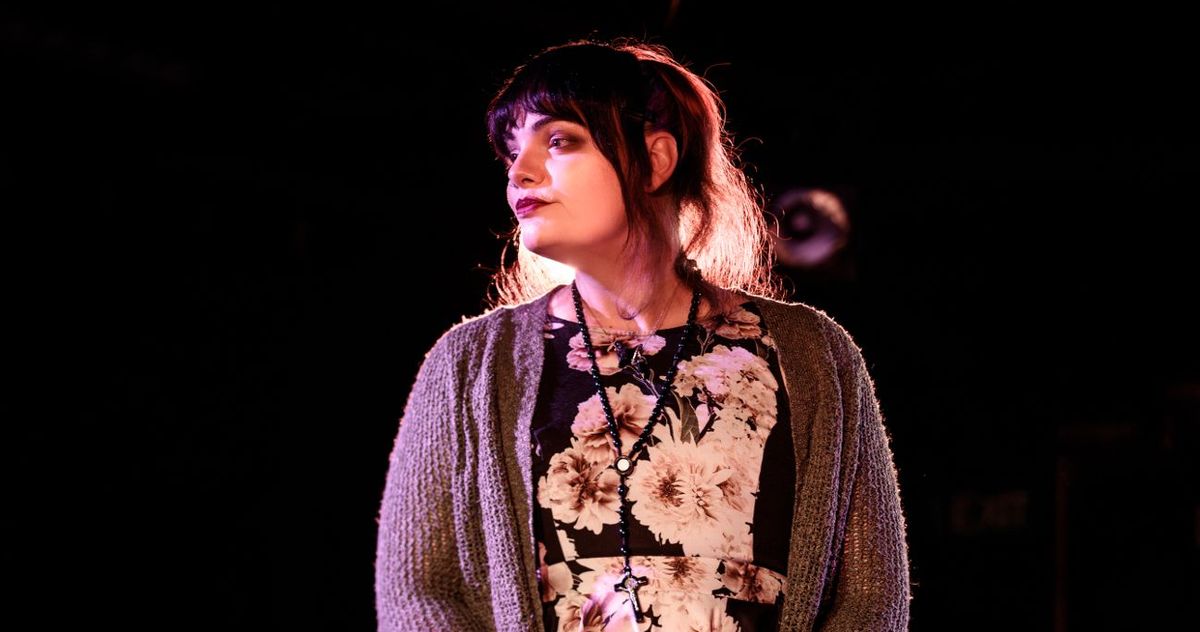From Munich Medea: Happy Family, at the WP Theater.
Photo: Julieta Cervantes
Bavaria’s capital and Euripides’s tragedy of infanticide have both very much and very little to do with the events of Munich Medea: Happy Family, Corinne Jaber’s unsettling play about childhood abuse, told in unflinching detail. And details are what Munich and Medea are: The main events of the play take place in southern Germany and pivot around a stage actor whose acclaimed roles include Jason in Medea. Played by Kurt Rhoads and credited simply as “Father,” the character stalks the upper level of the set liked a caged big cat, occasionally interrupting the two women, Alice (Heather Raffo) and Caroline (Crystal Finn), as they tell braided monologues about their adolescent relationships with him on the level below.
The word that kept coming to my mind while watching Munich Medea, a co-production of WP Theater and PlayCo, is “crystalline”: clear, sharp, and liable to make you bleed. Nothing about Jaber’s writing, nor Lee Sunday Evans’s crisp and ominous direction, softens the discomfort of what Alice and Caroline have to share. The two women are retelling their stories from middle age, as we quickly learn of some rift that occurred between them in their teenage years and of the separate ways in which Father took advantage of them. Alice is the daughter of Syrian and East German refugees, an outsider at school who, as a teenager, sees the actor’s performance and enters a sexual relationship with him. Caroline is his daughter. Hers may be the Happy Family side of the play’s title, but there clearly is buried darkness in her description of her family’s attempts at a cheery façade. Her father, she says early on, works late in the room next to her bedroom, and she dreads the sound of his sports TV. “I still don’t know what that is / Happy family,” she says, “But it does exist / I know it does.”
Caroline and Alice present their stories to us on opposite sides of the nearly bare floor of the stage, which resembles the basement level of a house with a lamp on one side and a sink on the other. There’s no physical divider between them, aside from a stairway leading ominously up to a floor above them, which is split in two. On one side, above Alice, set designer Kristen Robinson has created a more realistic rendering of Caroline’s father’s dressing room. On the other, above Caroline, there’s a space walled off from the audience with a window, seemingly an exterior view of his home. But as the play begins, it’s as if Caroline and Alice are in separate confessional booths unaware of each other, each sharing one side of a story the other does not fully know.
That’s where Jaber’s commitment to detail comes in. The abuse Caroline’s father enacted on Alice and Caroline is not enacted onstage — that would be too much to bear — but it is described explicitly, as are all sorts of other bits of context: The way that German people don’t trust Alice’s ability to speak their language, the apathy of Caroline’s mother, the ways that mealtime was different at each of their houses. Those specifics, the Munich and Medea of it all, add up to a level of convincing, upsetting, and messy reality. Jaber, a German Syrian writer and actor born in Munich, renders the terms with which these events may have played out with a level of plausibility that makes it all the harder to dismiss. The characters and their actions aren’t easy parables. As Alice describes her attraction to Father—“not love,” she says, “that’s just what I’d like to imagine / makes for a better play” — she challenges the audience to understand how it happened:
Don’t give me the HOW COULD YOU
And WHY HIM
And all the other shit I get from you
Just try and go down that path for a little while
It’s a lot to ask for actors, too, to go down that path, but Raffo and Finn manage to hold the course. Raffo’s Alice, in boots, jeans, and a rolled-up shirt, is more openly confrontational, used to a lifetime as an outsider, while Finn’s Caroline is prim and retiring, looking like Shelley Duvall in a three-piece pantsuit. Their two energies compliment each other, and even when they speak separately, a feeling of support flows between them. Because they are so separate for most of the performance, there’s a charge whenever Raffo and Finn move closer, even before their characters have started to become aware of the other’s experiences with Caroline’s father. Some flickers of warmth start to enter the picture.
There’s a crucial sense that, in describing this horror, something good will come in, shouldering the burden collectively. If not, the play might lead just to despair. Evans, who has directed both the adolescent mania of Dance Nation and the grandeur of Oratorio of Living Things, makes Munich Medea, for all the discomfort it provokes, feel like a holy rite. As the play continues, Alice and Caroline start to see each other with the same fullness that we, the audience, have come to understand them. Like the characters, we’re here in the darkness to receive these stories and perhaps, in sharing them, to heal.
If Munich Medea attacks a type of trauma through extreme specificity, Phillip Howze’s Self Portraits (DELUXE) takes an opposite, more opaque tack, though Howze reveals much by letting his work untether itself from literal interpretation. His play occurs across a series of enacted self portraits— according to his script, the first few are made before an audience enters the picture, including the instruction to performers to write a letter to their future selves and then turn it into a papier-mâché object—many of them framed in reference to the sprained, splaying feeling of being Black in America. The first segments that you witness as an audience member involve Howze, in a white jumpsuit painted with a black shadowy figure, working the room like a shy stand-up at an open mic. He and director Dominique Rider mine and intensifiy the nervous energy of strangers watching him, soliciting people’s names with his microphone and then telling a story about a woman saying the N-word at a deeply uncomfortable party in Connecticut for a white South African artistic eminence, the punch line of which may as well be “Of course we don’t have apartheid here in the United States.”
From Self Portrait (Deluxe), at JACK.
Photo: Maria Baranova
The work, when Howze is operating at his peak level, has that high-frequency dark humor, delivered over a gut punch of discomfort. In another sequence, Howze lies under a distorted mirror with skis hanging above him, like he’s fallen in the snow. It’s a clever setup, maybe too clever — there’s a joke about this not being the mountaintop Martin Luther King Jr. was referring to — and it held me at more of a distance. He’s better on his feet, as he is in a sequence that follows the snow scene, meticulously internally timed — “God is in the details, and in the eyes, and in the silences,” reads the script — wherein he arranges members of the audience along a wall, gently asking them to pose, you soon realize, with their hands up in a way that resembles perps being detained by the police. All Howze’s quietude and care, then, make the activity all the more forcibly unsettling. It’s followed by another self portrait where Howze, his shadow projected on the wall, mouths silent reactions to a monologue from a mother figure asking him to share the details of a seeming act of violence upon him. The pairing of the two, and the stark refusal to elaborate, creates this blank but rich space on which you can project so much.
It feels wrong to reveal more of the self portraits Howze has planned, but the piece opens up from there, and like Munich Medea, it points to a kind of healing — this time, with the aid of music by Devon Gates. Howze and Rider present a comforting ritual by way of a concert, with a few more eager members of the audience invited to contribute their own little reactions to the melodies. You could feel a collective release from those of us watching, after we’d gotten to know each other with Howze’s prodding, as the music resolved from atonal skitterings to more gentle harmonies. Though we probably couldn’t articulate it exactly, we’d been through so much together.
Rounding out a weekend of immersing myself in staged trauma, I saw Ryan Drake’s spiky and assured you don’t have to do anything, which keeps its eye on a manipulative relationship’s lingering aftereffects. The play’s narrator, Teddy, a chipper-to-the-point-of-concern Yaron Lotan, introduces himself as that familiar trope of a relatable gay outsider, arriving at a new private school for seventh grade, where he meets Clark (Will Dagger of Corsicana; Will Arbery happens to be producing this), a typical kind-of-weird kid, who, at 15, is two years too old for his grade — in an early red flag, he offers conflicting explanations for his having been held back. Clark latches onto Teddy immediately, trying to get him to skip an orientation and hang out, then messaging him insistently over AIM and eventually encouraging Teddy to invite him over for a sleepover, where Clark pressures Teddy into bedroom acts he’s not ready for.
From you don’t have to do anything, at HERE Arts.
Photo: Maria Baranova
You don’t have to do anything is a bit like a dark twin to “It gets better”–style adolescent YA like Heartstopper, where two queer loners find each other and heal and face down homophobia together. Clark’s attachment to Teddy mostly disorients and unsettles him, pushing Teddy away from his friends — Andrea Abello is a breath of fresh air as his deeply normie but gently perceptive friend Enid — and toward the charged depths of online chat rooms (Miles Elliot appears as a series of masc doms, or as a stranger posing as such). Director Ryan Dobrin conjures the dread, awkwardness, and thrill that comes with a particular kind of sexual experimentation mediated through the internet, having the actors imbue verbatim chat transcripts (including your “hahas” and “btws”) with the emotion of the character typing them. As I’m someone who came of age in the same context as Teddy, the rawer feelings behind the posturing terseness of lines like “ASL?” and “send pics” was skin-crawlingly familiar (and occasionally just funny).
Though Clark leaves Teddy’s school, Teddy can never quite escape him — or, as Drake proposes, he may not want to. Dagger can be totally menacing in one moment and then soft as a scolded kid in another, and he keeps you off balance with Clark’s confessions and manipulations (does he really have a boyfriend? Is he really in Spain?), such that you understand Teddy’s slips toward forgiveness. It’s notable, too, that you don’t have to do anything doesn’t point toward a way out of this dynamic — unlike in Munich Medea or Self Portraits, there isn’t much of a path to healing — because a relationship defined largely by online connection can be so hard to end. There are so many avenues to staying in touch that a clean break is impossible. Clark may disappear from Teddy’s life and then reappear out of the blue, their conversations progressing across AIM, texting, and Facebook, usernames changing but the dynamic staying the same. He’s there, even, as a ghostly presence during sex with someone else. Rather than coming of age, Teddy gets stuck in adolescence, enabled by mechanics of the internet. We’re emotionally frozen, maybe, by the very means by which we so eagerly agree to stay connected.
